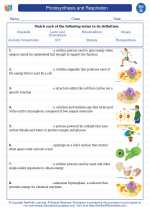Photosynthesis and Respiration -> conductor
Conductor
In science, a conductor is a material or substance that allows the flow of electric current. This means that conductors have a high density of free electrons that can move easily through the material when a voltage is applied. Conductors are essential components in electrical circuits, as they enable the transfer of electric charge and the generation of electrical power.
Properties of Conductors
Conductors have several distinct properties that make them suitable for carrying electric current:
- High Electrical Conductivity: Conductors have a high ability to conduct electricity due to the presence of free electrons that can move easily through the material.
- Low Resistance: The resistance of a conductor to the flow of electric current is relatively low, allowing for efficient transfer of electrical energy.
- Good Thermal Conductivity: Many conductive materials also exhibit good thermal conductivity, allowing them to efficiently transfer heat energy.
- Malleability and Ductility: Some conductors, such as metals, are malleable and ductile, meaning they can be easily shaped and stretched into wires without breaking.
Examples of Conductors
Common examples of conductive materials include:
Applications of Conductors
Conductors are widely used in various electrical and electronic devices, including:
- Electric wiring and cables
- Electrical transmission lines
- Electronic circuitry
- Power generation systems
- Electrochemical processes
Study Guide
When studying conductors, it's important to understand the following key points:
- What are the properties of conductors that make them suitable for carrying electric current?
- How do conductors differ from insulators in terms of their ability to conduct electricity?
- Why are materials such as copper and aluminum commonly used as conductors in electrical wiring?
- What are some real-world applications of conductors in electrical and electronic systems?
- How does the conductivity of a material affect its usefulness as a conductor?
By understanding the properties, examples, and applications of conductors, you can gain a comprehensive knowledge of this fundamental concept in electricity and magnetism.
.◂Science Worksheets and Study Guides Seventh Grade. Photosynthesis and Respiration
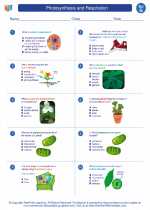
 Worksheet/Answer key
Worksheet/Answer key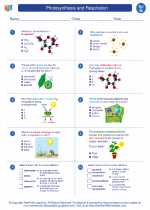
 Worksheet/Answer key
Worksheet/Answer key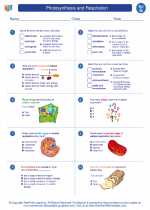
 Vocabulary/Answer key
Vocabulary/Answer key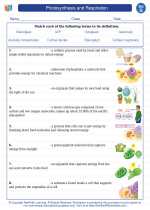
 Vocabulary/Answer key
Vocabulary/Answer key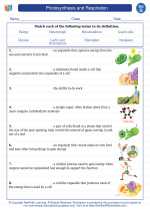
 Vocabulary/Answer key
Vocabulary/Answer key